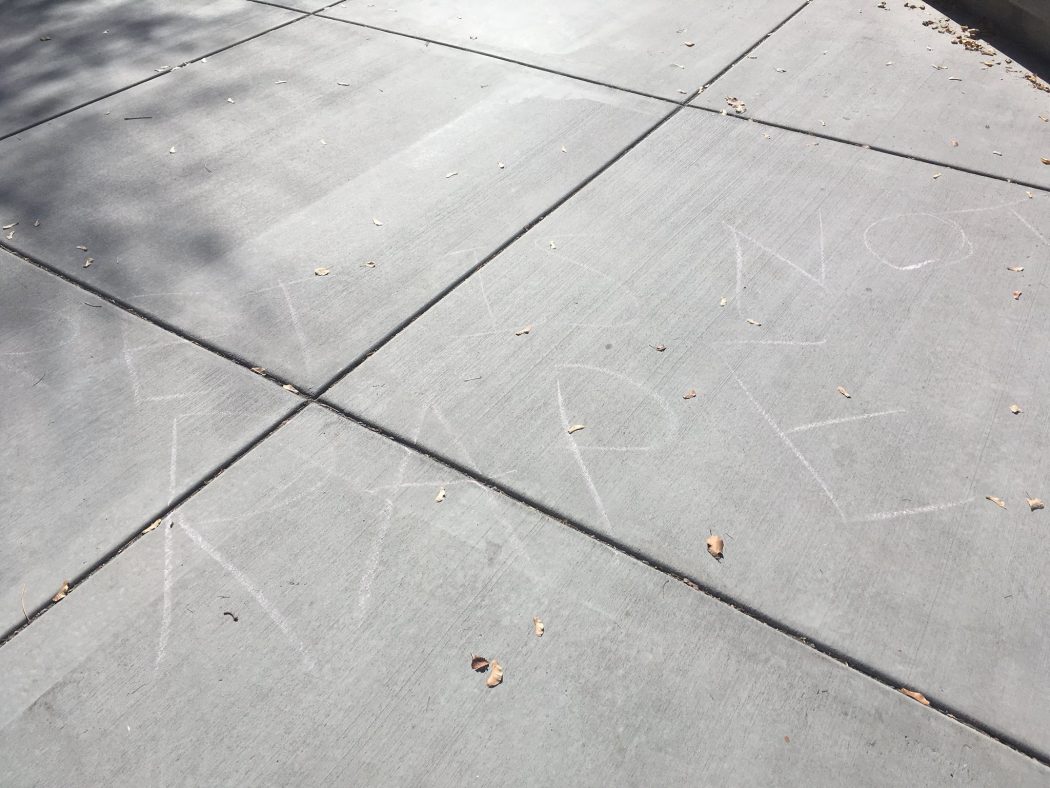Young Americans for Freedom’s chalk project sparks debate on free speech
Utah State University’s chapter of Young Americans for Freedom garnered some negative attention last week with its annual free speech project, a project in which members write quotes in sidewalk chalk across campus.
Students on Twitter condemned one quote in particular, previously located by the Eccles Science Learning Center but since erased from the sidewalk by an unknown source, that read: “Regret is not rape.”
“This is about more than just free speech,” said Paulina Rivera, who currently works with USU’s new Latinx Cultural Center.
“I think it’s really exhausting that we have to have this conversation over and over again about these false narratives implying that victims of sexual assault are liars,” Rivera said.
Rivera also said she feels like there is a double standard in the way free speech is viewed on campus.
“It seems like one demographic can say whatever it is that they want to say even if it might be hateful and divisive rhetoric and it’s viewed like it’s completely fine,” Rivera said. “But I think that when other demographics use their speech to talk about issues that affect minorities like microaggressions, it’s viewed as problematic.”
Taylor Cripe, the president of the local Young Americans for Freedom chapter, said the project was intended to promote free speech — especially for young conservatives — and to inform students of their rights to free speech.
“We are a conservative ideology club and a lot of times on campuses you see conservative speakers getting shut down and certain types of speech that the majority of students may not be on board with being censored,” Cripe said. “So this was important to kind of start the conversation.”
Cripe said the club did not discuss what they would write specifically before going out to do the project though they had established guidelines for what should or should not be written, like not writing racial slurs, making threats, or directing quotes at any specific person.
The identity of who wrote the “regret is not rape” quote is unknown. However, Cripe referenced the quote back to an argument popularized by author Cathy Young and Breitbart editor-in-chief Alex Marlow: That women are reporting rape or sexual assault in cases of consensual sex they later come to regret.
“I don’t necessarily have a problem with [the quote] because one of the things that is becoming commonplace is women who may have had, say, a completely consensual one night stand might start to regret the decision and come out to say ‘he assaulted me’ which is not the case,” Cripe said. “I think the point of that was to say that it’s not rape if you just regret the sex.”
Cripe referenced popular comedian Aziz Ansari’s sexual misconduct allegations as an example.
A 2010 study examining reports over a 10-year period and previous research found that false rape allegations make up about 2 percent to 10 percent of all rape allegations.
Cripe also addressed the erasing of the quote.
“The beautiful thing about free speech is that they can also use their free speech, and then we can come back and write something again,” Cripe said.
“There will always exist a tension between the freedom of the individual to speak and the freedom of the individual to be protected from harm caused by speech,” said Michelle Bogdan-Holt, the director of the Access and Diversity Center and participant on the free speech panel USU held two weeks ago.
“It is one of the most difficult, complex, and contentious issues happening today and it is important to understand how free speech operates on a college campus,” Bogdan-Holt said.
She pointed out that, as a public institution, USU cannot censor or punish speech because a person or group finds it offensive or hateful, though they can censor or punish speech that legally meets the criteria for “harassment, true threats, destruction of property or disrupts the learning environment.”
Bogdan-Holt emphasized the importance of creating opportunities for dialogue, but added that these opportunities can be missed if we don’t consider the impacts of our speech on others.
“YAF had the right to exercise free speech just like any other student group on campus,” Bogdan-Holt said. “However, just because you can say something doesn’t mean you should. Our words have power. We need to consider the impact our words have on other people.”
Bogdan-Holt said she believes USU can promote both free speech and inclusion.
“We continue to promote an inclusive culture based on mutual respect where diverse and controversial views are addressed through robust debate and ensure that learning environments are structured for the civil expression of ideas,” she said.
“Help students feel that they belong and make them passionate advocates and practitioners of free speech,” Bogdan-Holt said. “Support purposeful dialogue with all who live and work on our campus about the complexities of free speech.”
@naomiyokoward
naomiyokoward@aggiemail.usu.edu

